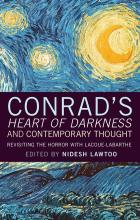We recently heard from Nidesh Lawtoo (Ph.D. 2009). After four years of teaching at the University of Lausanne he is now a visiting scholar at The Humanities Center (Johns Hopkins University). He also sent news of his recent publications.
Conrad's 'Heart of Darkness' and Contemporary Thought
Bloomsbury Academic, 2012; Nidesh Lawtoo (editor)
With its innovative narrative structure and its controversial explorations of race, gender and empire, Joseph Conrad's Heart of Darkness is a landmark of 20th century literature that continues to resonate to this day. This book brings together leading scholars to explore the full range of contemporary philosophical and critical responses to the text. Conrad's Heart of Darkness and Contemporary Thought includes the first publication in English of philosopher Philippe Lacoue-Labarthe's essay, 'The Horror of the West', described by J. Hillis Miller as 'a major essay on Conrad's novel, one of the best ever written'. In the company of Lacoue-Labarthe, leading scholars explore new readings of Conrad's text from a full range of theoretical perspectives, including deconstructive, psychoanalytic, narratological and postcolonial approaches. Drawing on the very latest insights of contemporary thought, this is an essential study of one of the most important literary texts of the 20th century.
http://www.bloomsbury.com/us/conrads-heart-of-darkness-and-contemporary-thought-9781441101006/
Also his newest book:
The Phantom of the Ego: Modernism and the Mimetic Unconscious (Studies in Violence, Mimesis, & Culture)
Michigan State Universtiy Press, 2013; Nidesh Lawtoo
The Phantom of the Ego is the first comparative study that shows how the modernist account of the unconscious anticipates contemporary discoveries about the importance of mimesis in the formation of subjectivity. Rather than beginning with Sigmund Freud as the father of modernism, Nidesh Lawtoo starts with Friedrich Nietzsche’s antimetaphysical diagnostic of the ego, his realization that mimetic reflexes—from sympathy to hypnosis, to contagion, to crowd behavior—move the soul, and his insistence that psychology informs philosophical reflection. Through a transdisciplinary, comparative reading of landmark modernist authors like Nietzsche, Joseph Conrad, D. H. Lawrence, and Georges Bataille, Lawtoo shows that, before being a timely empirical discovery, the “mimetic unconscious” emerged from an untimely current in literary and philosophical modernism. This book traces the psychological, ethical, political, and cultural implications of the realization that the modern ego is born out of the spirit of imitation; it is thus, strictly speaking, not an ego, but what Nietzsche calls, “a phantom of the ego.” The Phantom of the Ego opens up a Nietzschean back door to the unconscious that has mimesis rather than dreams as its via regia, and argues that the modernist account of the “mimetic unconscious” makes our understanding of the psyche new.
